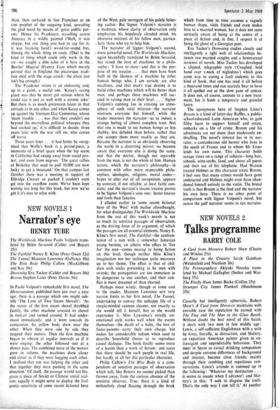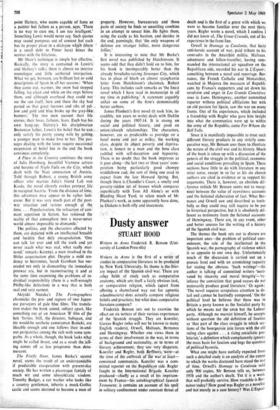NEW NOVELS 2
Talks programme
BARRY COLE
A Place in the Country Sarah Gainham (Weidenfeld and Nicolson 30s) The Pornographers Akiyuki Nozaka trans- lated- by Michael Gallagher (Secker and War- burg 35s) The Firefly Hun/ James Burke (Collins 25s) Strumpet City James Plunkett (Hutchinson 35s) Casually but intelligently aphoristic, Robert Shaw's A Card from Morocco maintains with enviable ease the reputation he earned with The Flag and The Man in the Glass Booth. Without doubt the best novel of this batch, it deals with two men in late middle age: Lewis, a self-sufficient Englishman with a wife be loves, literally, to distraction, and Slattery, an expatriate American painter given to ex- travagant and unpredictable behaviour. They meet in Spain as casual drinking companions and despite extreme differences of background and interest, become close friends, mainly through their rambling and repetitious con- versations. Lewis's attitude is summed up in the following: 'Whatever my destination . . . it seems to recede when I advance'; and Slat- tery's in this: 'I seek to disguise the truth. That's the only way I can tell it.' At another
point Slattery, who seems capable of fame as a painter but failure as a person, jays, 'There is no way to cure me, I am too intelligent.'
Something Lewis would never say. Such quotes may sound pompous out of context but each
has its proper place in a dialogue whit% (there is a small debt to Pinter here) fiiixes the serious with the hilarious.
Mr Shaw's technique is simple but effective. Basically, the story is contained in. Lewis's' and Slattery's talks; there is almost no interior monologue and little authorial interjection. What we get, between, are brilliant hot or cold descriptions of Spain in all her seasons: 'When they came out, warmer, the snow had stopped falling, lay clean and white on the steps before
them, and although overhead they could not see the sun itself, here and there the sky had parted so that great furrows and ribs of yel- low and gold and blue broke up the grey-like.. banners.' The two men recount their life stories, their loves, failures; fears. Each has his own hang-up; Slattery's his disciplinarian Bostonian father, Lewis's his belief that he can only satisfy his pretty young wife- by 'getting.. a younger man to make love to her. The pas- sages dealing with the latter require occasional suspension of belief but in the end the book convinces completely.
A Place in the Country continues the -story of Julia Homburg, beautiful Viennese actress and heroine of Night Falls on the City, which dealt with the Nazi annexation of Austria. Told through Robert, a young British army officer who marries Julia's friend Lali von Kasda, the novel cleverly evokes postwar life in occupied Austria. 'From the distance of time, this adventure may appear to be rather ludi- crous. But it was very much part ,of the post-
' war situation and serious enough at the time. . . . Popularisation, the refraction of con- stant repetition in 'fiction, has removed the reality of that atmosphere into a never-never world almost impossible to dismantle.'
The politics, and the characters affected by them, are depicted with an intellectual breadth and lucidity that defy encapsulation. 'One can talk for ever and tell the truth and yet never reach what was real, what really mat- tered,' remarks Kerenyi, a man involved in the Hitler assassination plot. Despite a mild ten- dency to histrionics, Sarah Gainham has suc- ceeded not only in dismantling the immediate postwar era, but in reconstructing it and at the same time examining the .problems. of in- dividual responsibility (there is a well-Wrought Philby-like defection) in a way that is both real and very earnest.
A kiy uki Nozaka's The Pornographers chronicles the pro- and regress of two Japan- ese purveyors of pale blue films. The transla- tion makes the book sound, subject apart, like something out of an American 'B' film of the late 'forties. Still, the director, Subuyan, and his would-be aesthetic cameraman Banteki, are likeable enough and one follows their in-and- out peripatetics among the rich with some sym- pathy. As a whole, though, the book lacks what might be called thrust, and as a result the \tell- ing comes off as less priapismic than-detu- mescent.
The Firefly Hunt, James Burke's' second novel, seems the result of an understandable if predictable exasperation with present-day society. He has written a picaresque fantaily of much wit and some idiosYntratic wisdom: Timothy -Badger, a car washer -who looks like a, country gentleman, inherits a mock -Gothic castle and seems destined to become a man of property. However, bureaucracy and. those Parts of society he finds so unsettling combine in an attempt to unseat him. He fights them, using the castle as his bastion, and decides in the,end, punningly, that `the only weapons of defence are stranger follies, more dangerous follies.'
It is interesting to note that Mr Burke's first novel was published by Hutchinsons. It seems odd that they didn't hold on to him, for his book is incomparably better than the already brouhaha-raising Strumpet City,• which has in place of blurb an almost sycophantic letter from Hutchinson's chairman, Robert Lusty. This includes such remarks as `the finest novel which I have read in manuscript in all my time in publishing.' A statement arguably unfair on some of the firm's demonstrably better authors.
James Plunkett's first novel (it took him, in- credibly, ten years to write) deals with Dublin during the years 1907-14. It is strong on social and political history, and good on union/church 'relationships. The characters, however, are as predictable as porridge on a hotel menir and just as milky; the working class, despite its abject poverty and depriva- tion, is honest to a man and the boss class raddled with self-deception and hypocrisy. There is no doubt that the book improves as it goes along—the last two or three years' com- position being particularly good chompy middlebrow cud, -the sort of thing one used to expect from the late Howard Spring. But, though there is, Chandler's Court, a smelly and poverty-ridden set of houses which compares superficially with Tom All Alone's or with Bleeding. Heart Yard, to relate much of Mr Plunkett's work, as some apparently have done, to Dickens is both silly and inaccurate.



































 Previous page
Previous page